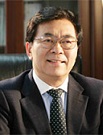Previous Fora / 2013
BAI, Chunli

President, Chinese Academy of Sciences
BAI Chunli, a well-known chemist and leading scientist in nanoscience, is the President of the Chinese Academy of Sciences (CAS).
He is also the President of University of Chinese Academy of Sciences (UCAS) and the President of the Presidium of the Academic Divisions of CAS, and has been newly elected as the President of the Academy of Sciences for the Developing World (TWAS) in Sept. 2012, and will start his term from Jan.1, 2013.
Prof. BAI graduated from the Department of Chemistry, Peking University in
1978 and received his M.Sc. and Ph.D. degrees from the CAS Institute of
Chemistry in 1981 and 1985 respectively. From 1985 to 1987, he worked with the
US California Institute of Technology in the field of physical chemistry as a
post-doctoral associate and visiting scholar. After back to China in 1987, he
continued his research at the CAS Institute of Chemistry. From 1991 to 1992, he
worked as a visiting professor at Tohoku University in Japan.
His research areas include the structure and properties of polymer catalysts,
X-ray crystallography of organic compounds, molecular mechanics and EXAFS
research on electro-conducting polymers. In the mid-1980s, he shifted his
research to the fields of scanning tunneling microscopy and molecular
nanotechnology.
Prof. BAI has a long list of scientific publications and has won more than
twenty prestigious awards and prizes for his academic achievements. He was
elected Member of CAS and Fellow of TWAS in 1997. He is also Member or Foreign
Member of nine world-known academies of science or engineering, including
Foreign Associate of the US National Academy of Sciences (NAS) and Foreign
Member of the Russian Academy of Sciences (RAS), Honorary Fellow of the Royal
Society of Chemistry, Member of the German Academy of Science and Engineering
(acatech) and Honorary Fellow of the Indian Academy of Sciences (IAS), Foreign
Member of the Royal Danish Academy of Sciences and Letters, and honorary
director or professor of several foreign universities.
He also serves as the Chief
Scientist for the National Steering Committee for Nanoscience and Technology
and was the Founding Director of China National Center for Nanoscience and
Technology.
Moreover, he was Member of the Executive Committee of IUPAC (2008-2009), and
Member of the International Editorial Advisory Board of JACS, Angewandte
Chemie, Advanced Materials and Chemical Physics
Letters.
CHAIR
09:00-10:30 26 NOVEMBER
PLENARY SESSION IV. “Science for natural resources”
